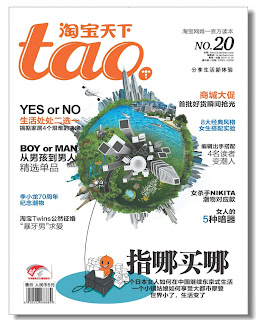By Loretta Chao
Of THE WALL STREET JOURNAL
BEIJING (Dow Jones)--Chinese e-commerce firm Alibaba Group Holding Ltd. is planning to expand its business-to-consumer online retail business, even as the burgeoning sector has grown increasingly competitive.
China's e-commerce market is expanding rapidly, with online transactions expected to grow to roughly 7% of China's massive retail market by 2013 from about 2% now, Hong Kong-based Deutsche Bank AG analyst Alan Hellawell said. Business-to-consumer transactions account for just a small portion of the overall market, but analysts said they expect that share to grow as shoppers increasingly look to buy goods online from brands and retailers they recognize.
As part of its efforts to expand its business-to-consumer business, the Hangzhou-based group's online retail company, Taobao.com, said Monday it separated the
Taobao Mall business-to-consumer portal http://www.tmall.com/ from its flagship consumer-to-consumer portal and gave it its own web address, Tmall.com.
Users could previously access Taobao Mall, on which vendors including Adidas AG, Fast Retailing Co.'s Uniqlo and Lenovo Group Ltd. sell goods to Chinese consumers, via Taobao.com.
Taobao.com Chief Financial Officer Daniel Zhang said Monday that Taobao Mall listings will still appear in Taobao.com search results, but the move is meant to differentiate the Taobao Mall brand and "give people a very clear idea that this is the first choice to find high-quality products."
He added he expects the value of transactions on Taobao Mall to grow 400% this year from last year, outpacing the growth of Taobao's consumer-to-consumer business. He declined to give a value for such transactions.
Taobao.com, which operates China's largest online retail website, has said it expects to double the value of consumer-to-consumer transactions conducted via its website to CNY400 billion ($59.9 billion) this year.
The separation of the two brands follows Taobao.com's appointment of Ye Peng, formerly chief operating officer of Chinese Internet search company Baidu Inc., as vice president overseeing Taobao Mall.
Research firm Analysys International said sales on Taobao.com accounted for 75% of all e-commerce transactions in China as of the second quarter. But while analysts said they expect Taobao.com to maintain its dominance in the overall market, they say Taobao's competition will intensify.
A number of competing business-to-consumer platforms have emerged in recent years, including 360buy.com, a website operated by Beijing Jingdong Century Trading Co. Amazon.com Inc. also operates a Chinese website, though both are much smaller than Taobao.com in terms of transaction value.
In addition, Baidu is working with Japan's Rakuten Inc. to launch an online shopping mall for Chinese Internet users, hoping to benefit from the search company's massive audience. The two companies plan to jointly invest $50 million in the site over the next three years, though a previous attempt by Baidu to enter the e-commerce market has yet to gain traction among Chinese users.
Taobao Mall will also face challenges from established, specialized websites for sales of goods such as air tickets, which the portal launched earlier this year.
For example, Ctrip.com International Ltd., China's largest online travel booking company, fills its own orders and has full control over its sales policies and service quality, while Taobao Mall, a platform for other merchants, doesn't actually fill orders.
Taobao Mall employs a number of measures to protect consumers, such as verifying the credentials of all of its Taobao Mall merchants and requiring that they all offer a seven-day, no-questions-asked refund policy. But service quality can still vary from merchant to merchant.
Taobao.com, which currently has 50 million daily unique visitors, said it will invest 200 million yuan over the next three months in a marketing campaign for Taobao Mall, including an ad campaign on state broadcaster China Central Television and an offline billboard campaign across major cities in China.
Alibaba Group, in which Yahoo Inc. owns a roughly 40% stake, is the parent of Hong Kong-listed business-to-business trading website Alibaba.com. (1688.HK).
-By Loretta Chao, The Wall Street Journal; 8610 8400 7799; loretta.chao@wsj.com
http://online.wsj.com/article/BT-CO-20101101-704939.html


















